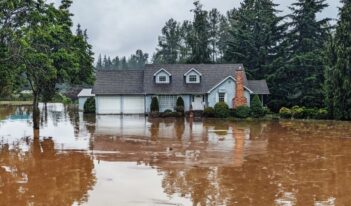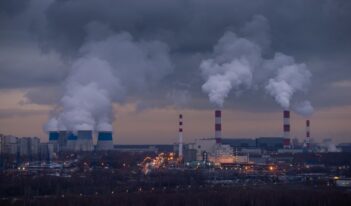
Scholars discuss regulatory climate change solutions in the context of national and global security.
Humans all over the world face critical vulnerabilities due to climate change—as do the nation states who must govern them.
Experts predict that shifts in climate will only worsen, and governments will have to reckon with the consequences. Climate change will fuel vicious competition over natural resources and damage infrastructure critical to modern life. It will also force communities, especially poor ones, to migrate, likely compelling them to endure rising xenophobia, political scapegoating, and exploitation.
Some experts consider these harsh predictions to be matters of “climate security.” Commentators disagree, however, on whose security this term should refer to and what security in response to climate change should look like.
Some authorities emphasize the impacts of climate change on the safety of individual nations. Under the Biden Administration, for example, the United States has declared action on climate change to be a key component in its strategy to protect its borders and military infrastructure.
Despite these commitments, however, some commentators contend that the U.S. military is still unprepared for the perils ahead. These advocates argue that American lawmakers should increase allocations to the military to address threats such as sinking naval bases, dependency on fossil fuel for weaponry, and domestic impacts of natural disasters.
In contrast to the national security perspective, other authorities emphasize the global security impacts of climate change. International relations experts warn that climate forces may lead to violent competition over resources, unmanageable migration, and increases in global poverty. Earlier this month, for example, member states of the United Nations Security Council released a joint statement calling for action to mitigate competition for resources in certain regions, which they warn could fuel recruitment into extremist groups.
Other experts object to framing climate change in terms of security at all—either national or global—on the grounds that it obscures who is to blame for and in control of many of these imminent harms: human actors and political forces. Some of these scholars point to securitization itself as a key driver of climate change, including through emissions of greenhouse gases via military supply chains and through wartime environmental destruction.
Rather than increase international defense activity, these advocates have called on governments to address climate impacts through legislative reforms that aim to protect vulnerable populations. Such proposals include amending international law to accommodate climate justifications for refugee status and reallocating resources from border security to support for climate-affected populations.
In this week’s Saturday Seminar, experts debate the international regulatory implications of climate change and the security of nations.
- The U.S. Department of Defense is uniquely situated to combat climate change, Mark Nevitt of Emory University School of Law argues in an article in the Northwestern University Law Review. Nevitt explains that the Defense Department holds expertise in risk mitigation, enjoys a reliable funding stream, and possesses the capacity to cut through partisan disagreements that might otherwise obstruct the country’s climate progress. It can also partner with state and local governments to initiate climate projects, he emphasizes. Nevitt recommends that U.S. policymakers prioritize the Defense Department in matters of climate in order to depoliticize and expand climate action.
- In an article in the North Carolina Journal of Law and Technology, practitioner Meredith Doswell urges policymakers to regulate solar radiation management (SRM). SRM is a process through which governments—and even nonstate actors—can reflect sunlight back into space to mitigate climate change impacts. Doswell emphasizes that SRM is controversial in part because of its capacity to disrupt Earth’s weather patterns, threatening both national and global security. She contends that current U.S. laws do not provide sufficient protection against mismanagement of SRM. Instead of waiting for international policy to emerge, the United States should issue domestic regulations now, Doswell urges.
- In an article in Ecology Law Quarterly, Nadia Senter argues that the Defense Department should change its position on offshore wind energy. Senter explains that the Defense Department has frequently opposed the development of offshore wind along the West Coast, citing concerns that the wind turbines could interfere with military training activities and naval missions. Senter contends, however, that offshore wind facilities can serve security interests as well. Investment in offshore wind, for example, would decrease American dependence on foreign oil and protect the U.S. military from disruptions to the power grid, Senter argues.
- U.S. lawmakers should develop environmental law in ways that reduce tension with global competitors, argues Edwin Kisiel, an attorney for the United States Space Force, in an article in the National Security Law Journal. Kisiel predicts that climate change will increase competition with global rivals, such as China, due to resource scarcity. Competing nations may attempt to implement more relaxed environmental standards to gain an advantage over the United States, Kisiel warns. To ensure that competitors conform with international environmental standards, Kisiel suggests that the United States should link trade agreements with foreign powers to environmental norms. Lawmakers, for example, could include economic sanctions and binding international arbitration in the case of environmental noncompliance, Kisiel recommends.
- In an article in the London Review of International Law, Eliana Cusato of the Netherlands’s Amsterdam Center for International Law argues that climate change is a “threat multiplier” that exacerbates a range of existing security threats, including food insecurities, ethnic conflicts, and immigration. Cusato cautions against attempts by international actors to use threats of environmental harm to legitimize militarization and security interventions. Cusato recommends instead that policymakers should examine how security-centered climate response measures are failing to address or even contributing to conflicts, including crises such as hunger, unemployment, and political repression.
- Climate change disasters are exacerbating sexual- and gender-based violence experienced by women, argue Bharat H. Desai of India’s Jawaharlal Nehru University and Moumita Mandal of the Centre for Global Cooperation Research in an article in Environmental Policy and Law. Desai and Mandal note that, during environmental disasters, women and girls are at higher risk of being victims of sexual- and gender-based violence. They contend that the “double victimization” that women and girls experience from climate change is insufficiently addressed. Desai and Mandal explain that existing international legal instruments lack specificity in addressing this issue. They contend, however, that the adoption of recent gender-focused policies by the United Nations is a positive step toward seeking a remedy. Desai and Mandal urge national and international agencies to follow suit.
The Saturday Seminar is a weekly feature that aims to put into written form the kind of content that would be conveyed in a live seminar involving regulatory experts. Each week, The Regulatory Review publishes a brief overview of a selected regulatory topic and then distills recent research and scholarly writing on that topic.



